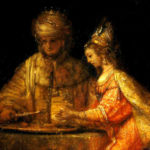We run our website the way we wished the whole internet worked: we provide high quality original content with no ads. We are funded solely by your direct support. Please consider supporting this project.
What is the significance of Numbers 16:41–48?
The day following the Korah incident (see vs. 20–35), the Israelites rebelled against Moses again, this time because they blamed him for the death of those who were judged the day before (vs. 41). The Lord was very angry because of this and said to Moses and Aaron, “Get away from this congregation, so that I may consume them in a moment” (vs. 45). People immediately began to die from a plague (vs. 46). Moses prayed while Aaron quickly “made atonement” for their sins (vs. 47) “and the plagued was stopped” (vs. 48).
The view that the future is eternally settled in God’s mind has the effect of undermining the honesty of God’s expressed intention to judge Israel and the power of prayer to change God’s mind as it is depicted in this passage.
Category: Q&A
Tags: Open Theism, Q&A
Topics: Open Theism
Verse: Numbers 16
Related Reading

What is the significance of Exodus 16:4?
The Lord commands the Israelites to gather only enough bread for one day while in the wilderness. “In that way,” the Lord says, “I will test them, whether they will follow my instruction or not.” Testing people to find out how they will resolve their character only makes sense if God is not certain of…

Free Will: Is it a coherent concept?
Greg is going to be spending the next several blogs talking about the idea of free will. In this first reflection, he discusses whether it is coherent to speak of a decision that is not determined or exhaustively caused.

Molinism and Open Theism – Part II
In the previous post on this topic I briefly outlined Molinism and then discussed “the grounding objection.” In this post I’ll first discuss another fundamental objection to Molinism and then discuss how it is overcome by the Open View of the Future. In the process it will be clear how the Open View differs from…

What is the significance of Esther 4:14?
The wise Mordecai encourages Esther to bravely risk her life by pleading the case of the Jews before King Xerxes, saying, “…if you remain silent at this time, relief and deliverance for the Jews will arise from another place, but you and your father’s family will perish. And who knows but that you have come…

Greg on the Open View of the Future
Greg was featured today on the Pangea blog. (Thanks Kurt!) The blog references a series of lectures Greg presented at the Open Theology and Science Conference at Azusa Pacific University, April 11, 2008 entitled “A Flexible Sovereignty: A Biblical Understanding of Providence and the Nature of the Future” . If you’re looking for a comprehensive video series on…

Doesn’t Psalm 139:16 refute the open view of the future?
One of the passages most frequently cited in attempts to refute the open view of the future is Psalm 139:16. Here David says that God viewed him while he was being formed in the womb (vs. 15) and then adds: “[Y]our eyes saw my unformed body. All the days ordained for me were written in…
